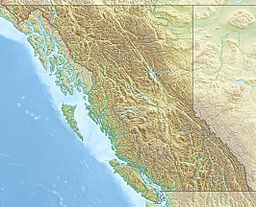Mount Pierre Elliott Trudeau facts for kids
Quick facts for kids Mount Pierre Elliott Trudeau |
|
|---|---|
| Highest point | |
| Elevation | 2,640 m (8,660 ft) |
| Listing | Mountains of British Columbia |
| Geography | |
| Location | British Columbia, Canada |
| Parent range | Premier Range |
| Topo map | NTS 83D/14 |
Mount Pierre Elliott Trudeau is a tall mountain in British Columbia, Canada. It stands at 2,640 meters (about 8,661 feet) high. This mountain is special because it was named after a very important person in Canadian history: Pierre Elliott Trudeau, who was once the Prime Minister of Canada. It's part of the beautiful Premier Range in the Cariboo Mountains.
Contents
Mount Pierre Elliott Trudeau: A Canadian Landmark
This impressive mountain is located in the Premier Range of the Cariboo Mountains. You can find it in the Interior of British Columbia, Canada. It sits on the south side of the McLennan River, not far from the town of Valemount. The mountain is a significant natural feature in this part of Canada.
What's in a Name? Honoring a Prime Minister
Mount Pierre Elliott Trudeau was named to honor Canada's fifteenth Prime Minister, Pierre Elliott Trudeau. He passed away in the year 2000. After his death, the Prime Minister at the time, Jean Chrétien, thought about renaming Mount Logan (Canada's highest peak) after Trudeau. However, this idea faced some disagreement.
The Naming Ceremony
Because of the resistance to renaming Mount Logan, this previously unnamed mountain was chosen instead. It was officially given the name "Mount Pierre Elliott Trudeau" on June 10, 2006. A special ceremony was held in Valemount, British Columbia, to mark the occasion. Pierre Elliott Trudeau's eldest son, Justin Trudeau, who later became Prime Minister himself, attended the event. This naming was a way to remember and honor his father's contributions to Canada.
Who Was Pierre Elliott Trudeau?
Pierre Elliott Trudeau was a very important figure in Canadian politics. He served as the Prime Minister of Canada for many years, first from 1968 to 1979, and then again from 1980 to 1984. He was known for his strong leadership and for introducing important changes to Canada. These included making Canada officially bilingual (English and French) and bringing in the Canadian Charter of Rights and Freedoms. Naming a mountain after him is a lasting tribute to his legacy.
 | Calvin Brent |
 | Walter T. Bailey |
 | Martha Cassell Thompson |
 | Alberta Jeannette Cassell |


